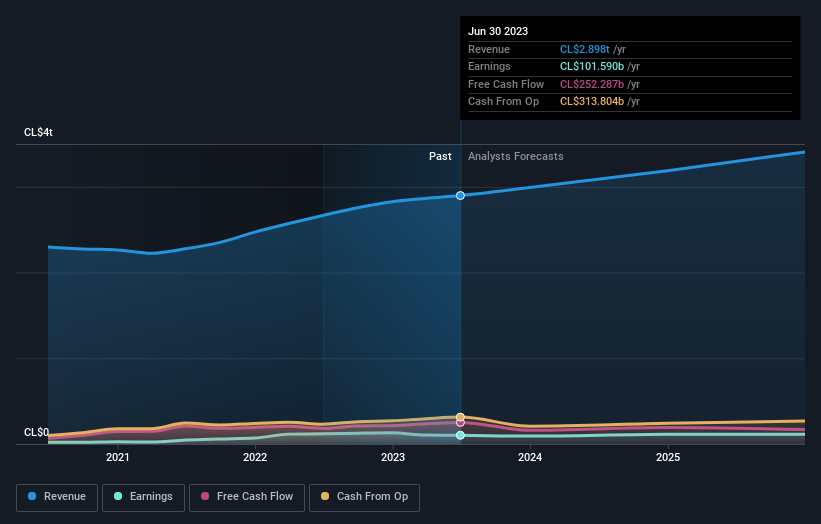Stock Analysis
- Chile
- /
- Food and Staples Retail
- /
- SNSE:SMU
Individual investors in SMU S.A. (SNSE:SMU) are its biggest bettors, and their bets paid off as stock gained 9.5% last week

Key Insights
- Significant control over SMU by individual investors implies that the general public has more power to influence management and governance-related decisions
- A total of 25 investors have a majority stake in the company with 41% ownership
- 17% of SMU is held by Institutions
To get a sense of who is truly in control of SMU S.A. (SNSE:SMU), it is important to understand the ownership structure of the business. And the group that holds the biggest piece of the pie are individual investors with 59% ownership. That is, the group stands to benefit the most if the stock rises (or lose the most if there is a downturn).
Clearly, individual investors benefitted the most after the company's market cap rose by CL$82b last week.
Let's delve deeper into each type of owner of SMU, beginning with the chart below.
See our latest analysis for SMU

What Does The Institutional Ownership Tell Us About SMU?
Institutions typically measure themselves against a benchmark when reporting to their own investors, so they often become more enthusiastic about a stock once it's included in a major index. We would expect most companies to have some institutions on the register, especially if they are growing.
As you can see, institutional investors have a fair amount of stake in SMU. This suggests some credibility amongst professional investors. But we can't rely on that fact alone since institutions make bad investments sometimes, just like everyone does. It is not uncommon to see a big share price drop if two large institutional investors try to sell out of a stock at the same time. So it is worth checking the past earnings trajectory of SMU, (below). Of course, keep in mind that there are other factors to consider, too.

Hedge funds don't have many shares in SMU. Inversiones SMU Matriz Ltda. is currently the largest shareholder, with 11% of shares outstanding. With 4.9% and 3.4% of the shares outstanding respectively, Inversiones Sams SPA and FIP Epsilon are the second and third largest shareholders.
A deeper look at our ownership data shows that the top 25 shareholders collectively hold less than half of the register, suggesting a large group of small holders where no single shareholder has a majority.
Researching institutional ownership is a good way to gauge and filter a stock's expected performance. The same can be achieved by studying analyst sentiments. Quite a few analysts cover the stock, so you could look into forecast growth quite easily.
Insider Ownership Of SMU
While the precise definition of an insider can be subjective, almost everyone considers board members to be insiders. The company management answer to the board and the latter should represent the interests of shareholders. Notably, sometimes top-level managers are on the board themselves.
Insider ownership is positive when it signals leadership are thinking like the true owners of the company. However, high insider ownership can also give immense power to a small group within the company. This can be negative in some circumstances.
We note our data does not show any board members holding shares, personally. Not all jurisdictions have the same rules around disclosing insider ownership, and it is possible we have missed something, here. So you can click here learn more about the CEO.
General Public Ownership
The general public, mostly comprising of individual investors, collectively holds 59% of SMU shares. With this amount of ownership, retail investors can collectively play a role in decisions that affect shareholder returns, such as dividend policies and the appointment of directors. They can also exercise the power to vote on acquisitions or mergers that may not improve profitability.
Private Company Ownership
We can see that Private Companies own 24%, of the shares on issue. It might be worth looking deeper into this. If related parties, such as insiders, have an interest in one of these private companies, that should be disclosed in the annual report. Private companies may also have a strategic interest in the company.
Next Steps:
It's always worth thinking about the different groups who own shares in a company. But to understand SMU better, we need to consider many other factors. Consider risks, for instance. Every company has them, and we've spotted 2 warning signs for SMU you should know about.
If you would prefer discover what analysts are predicting in terms of future growth, do not miss this free report on analyst forecasts.
NB: Figures in this article are calculated using data from the last twelve months, which refer to the 12-month period ending on the last date of the month the financial statement is dated. This may not be consistent with full year annual report figures.
Valuation is complex, but we're helping make it simple.
Find out whether SMU is potentially over or undervalued by checking out our comprehensive analysis, which includes fair value estimates, risks and warnings, dividends, insider transactions and financial health.
View the Free AnalysisHave feedback on this article? Concerned about the content? Get in touch with us directly. Alternatively, email editorial-team (at) simplywallst.com.
This article by Simply Wall St is general in nature. We provide commentary based on historical data and analyst forecasts only using an unbiased methodology and our articles are not intended to be financial advice. It does not constitute a recommendation to buy or sell any stock, and does not take account of your objectives, or your financial situation. We aim to bring you long-term focused analysis driven by fundamental data. Note that our analysis may not factor in the latest price-sensitive company announcements or qualitative material. Simply Wall St has no position in any stocks mentioned.
About SNSE:SMU
Very undervalued with mediocre balance sheet.

